The Health Triangle: How Sleep, Stress Management, and Recovery Drive Peak Performance – in the gym and beyond!
Ever hit the gym hard and meticulously track every calorie, only to find yourself stuck in a performance rut? You’re not alone. Many fitness enthusiasts dive headfirst into workouts and nutrition plans, but still wonder, “Why aren’t I seeing the results I crave?” or “Is my sleep sabotaging my gains?” When you’re grappling with questions like, “How does stress impact my fitness progress?” or “Why is recovery so important for muscle growth?”, it’s easy to feel stuck in a loop.
The good news is, you can cut through the noise and build a sustainable path to health and peak performance by focusing on the foundation of the Health Triangle: sleep, stress management, and recovery.
In this blog, I’ll break down the Health Triangle and highlight the base of the triangle that supports lasting fitness and wellbeing – sleep, stress management and recovery.
Let’s demystify the chaos and set you on a path to a healthier, more balanced you.
What is the perfect approach for achieving sustainable health and fitness?
THE HEALTH TRIANGLE
A holistic model that underscores the importance of a balanced foundation—sleep, stress management, recovery, mindset and resilience—as essential components for achieving peak performance and maximising success in- and outside the gym.
In other words, while intense workouts and a balanced diet are vital, they’re only part of the equation. To truly thrive, you must also prioritise rest, stress reduction, recovery and focus on building a bulletproof mindset and bounce forward resilience!
The added benefit? By mastering these foundational elements, you’ll unlock enhanced performance, improved mental clarity, and a resilient, balanced body.
Sleep isn’t just downtime; it’s your body’s natural supercharger, crucial for repair, recovery, and overall health.
Scientific studies consistently show that adequate sleep is vital for muscle recovery, hormone regulation, and cognitive function. Poor sleep can derail your fitness goals by impairing muscle growth and increasing injury risk (Simpson et al., 2016).
All too often, as leaders, we prioritise workouts and diet while skimping on sleep, thinking you can make up for it with sheer willpower. Spoiler alert: You can’t.
What is the the key to success?
Good sleep hygiene! Embrace sleep as a non-negotiable part of your daily regimen. Aim for 7-9 hours of quality sleep each night and establish a consistent sleep routine.
1 Small step to gets started
Set a bedtime alarm to remind you to start winding down. Create a sleep sanctuary by minimising blue light exposure and ensuring your bedroom is cool, dark, and quiet.
Stress management encompasses strategies to control and reduce stress, preventing it from undermining your health and fitness efforts.
[Side note: not all stress is bad, and can actually enhance your performance – it’s when the stress becomes chronic, that’s when it becomes a problem]
Chronic stress triggers cortisol production, which can lead to muscle breakdown, fat retention, and impaired recovery (McEwen, 2006). Managing stress is essential to maintaining a healthy body and mind.
Even with a killer workout routine and balanced diet, unmanaged stress can leave you feeling burnt out and stagnant, derailing your progress.
What is the the key to success?
Incorporate stress-busting activities into your daily life. Whether it’s meditation, yoga, or simply taking time to unwind, finding what helps you relax is crucial.
1 Small step to get started
Dedicate five minutes each day to deep breathing or meditation. Apps like Headspace or Calm can guide you through simple yet effective techniques.
Recovery involves practices that allow your body to repair and strengthen after workouts or even an intense day in the office, ensuring you’re ready for the next challenge.
Recovery is where the magic happens—muscles repair and grow, and the body adapts to the stresses of training. Without it, you risk overtraining, which can lead to fatigue, decreased performance, and injuries (Meeusen et al., 2013).
Pushing through pain, skipping rest days, and ignoring signs of overtraining are common mistakes that can set you back.
What is the key to success?
Integrate recovery strategies such as active recovery days, stretching, foam rolling, and adequate hydration into your routine.
1 Small step to get started
Schedule at least one full rest day each week. On active recovery days, engage in light activities like walking or gentle yoga to keep your body moving without overloading it.
Putting It all together for your perfect approach to achieving peak performance
There you have it—the foundation of the perfect Health Triangle: sleep, stress management, and recovery. It might seem like a lot to juggle alongside your workouts, meal prep, endless meetings and client dinners, but remember, balance is key. Start by implementing small changes: prioritise your sleep, find effective stress management techniques, and honour your body’s need for recovery.
By building a strong foundation with these elements, you’ll not only enhance your fitness results but also cultivate a healthier, more resilient lifestyle, all leading to achieving peak performance in the gym and beyond. Embrace the Health Triangle, and watch as your journey to lasting health and wellbeing unfolds with newfound balance and vigour.
It’s time to level up your health game—are you ready to take action?
At Your Future Forward, I make it my mission to help leaders like you optimise your health and habits for peak performance. If you’d like to know more or work with me, please drop me a line here. I love hearing from leaders who are ready to take their performance to the next level.
Stay strong, stay balanced!
Yvette



